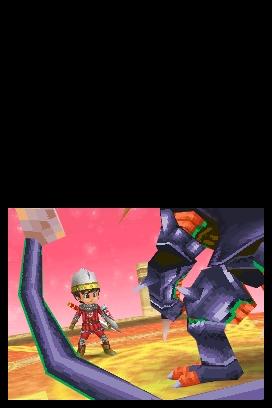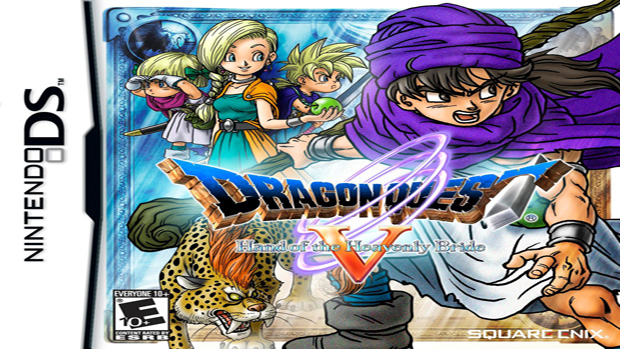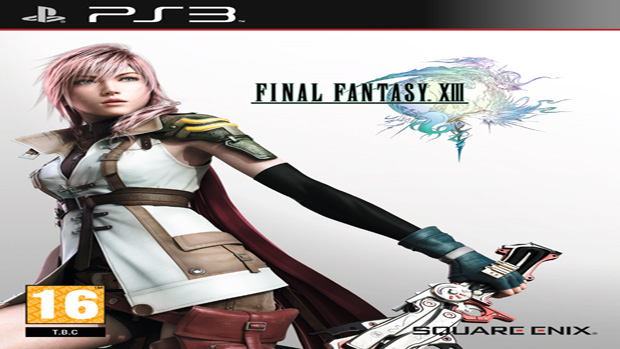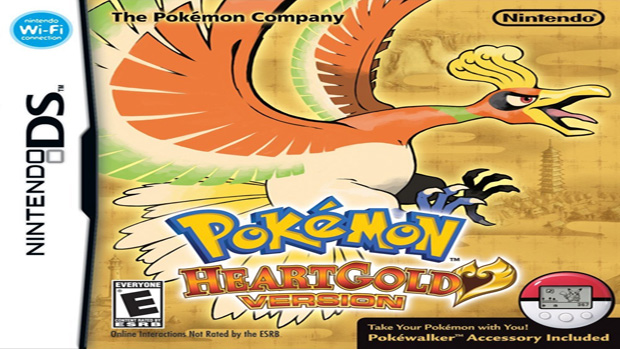GamesRadar+ Verdict
Pros
- +
Provides traditional RPG feel like no other
- +
One of the best looking DS games ever
- +
Promises hundreds of hours of play
Cons
- -
Multiplayer options occasionally hurt story
- -
Too old school for some
- -
Heavy accents steal focus from plot
Dragon Quest is the granddaddy of the JRPG, and in Japan it has been consistently one of the most popular series ever, with each new entry or remake selling in the millions. Meanwhile, its western fan base has been considerably smaller, though it’s no less dedicated. Perhaps it has to do with the series’ steadfast adherence to the same decades old gameplay, or maybe it’s too kiddy for some. With the international release of the first new entry in the series in five years, Dragon Quest IX: Sentinels of the Starry Skies, the series has another chance at catching on with a whole new audience. But after failing to catch on with the English-speaking masses before, can this one to do the trick?
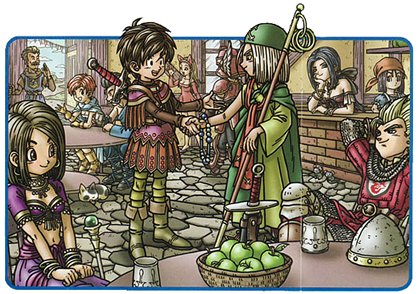
A traditionalist with some new tricks
When comparing the two giants of Japanese RPGs, Final Fantasy and Dragon Quest, DQ has always been the more conservative of the two. While FF embraced new graphics, gameplay mechanics, and story-telling techniques, DQ had to be dragged kicking and screaming into the future. DQIX, despite being on a portable, is a major step forward for the series in so many ways.
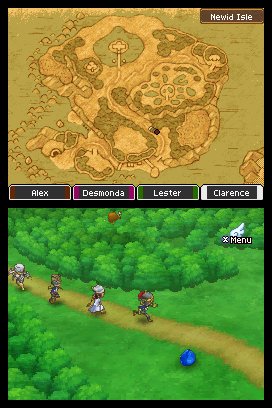
Though the core grinding and battle mechanics are incredibly familiar, DQ has caught up with its competitors by finally displaying the enemies on the world map. This may sound small or even expected, but it fixes one of the series biggest issues: the incredibly huge amount of random battles. Sure, the monsters might chase after you, but at last you aren’t damned to be continually fighting weak enemies when backtracking old areas, and you actually have a chance of escaping more powerful baddies you aren’t ready for.
Another biggie is incorporating the insane amount of customization you have with the characters in your party. Not only is there a deep class system with skill points to assign to differentiate your character from all the others out there, but every single item your character can wear or use actually appears on the model. Instead of equipment just being a bland set of numbers, your fashion choices actually contribute to the character’s, well, character. Instead of every mage or warrior looking exactly the same, each has their own look.
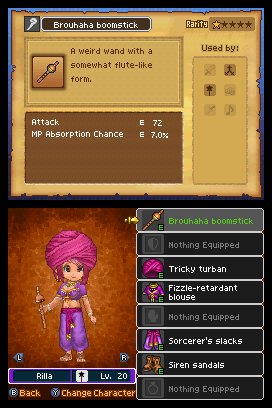
This game is pretty hard on obsessive collectors, thanks in no small part to the alchemy system. Hundreds of items you either buy, gain in battle, or find just sitting there in the overworld can be combined to create a multitude of other items, including new weapons and armor that can’t be found anywhere else. Since you find the recipes on bookshelves all over the world, it finally gives a reason to check every single bookcase you find, which previously gave story hints or a cute joke at best. Yes, this was in DQVIII so it isn’t entirely new, but the feature has only deepened since.
And unlike the recent Dragon Quest DS remakes, this one is out to push the system about as far as it can go graphically. Every monster, environment, character, everything is in full 3D, which makes the amount of customization and the insanely deep bestiary even more remarkable. Longtime Quest fans will be happy to see that even though the series took a technological step backwards from the eighth entry on the PS2, it’s still one of the most advanced in series history.
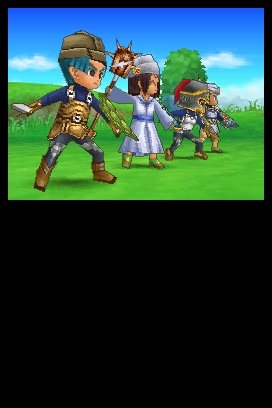
Square-Enix was smart to take the series to a handheld, and not just for business reasons. These days, the older DQ fans don’t really have as much time to sit in front of a TV to play 50 hours of one game. But on a handheld, not only do the short bursts of play fit the system nicely, staring at the DS screen for that long, especially on a commute, just doesn’t seem as taxing. And were this on an advanced console, we might be less forgiving of the game’s anachronisms.
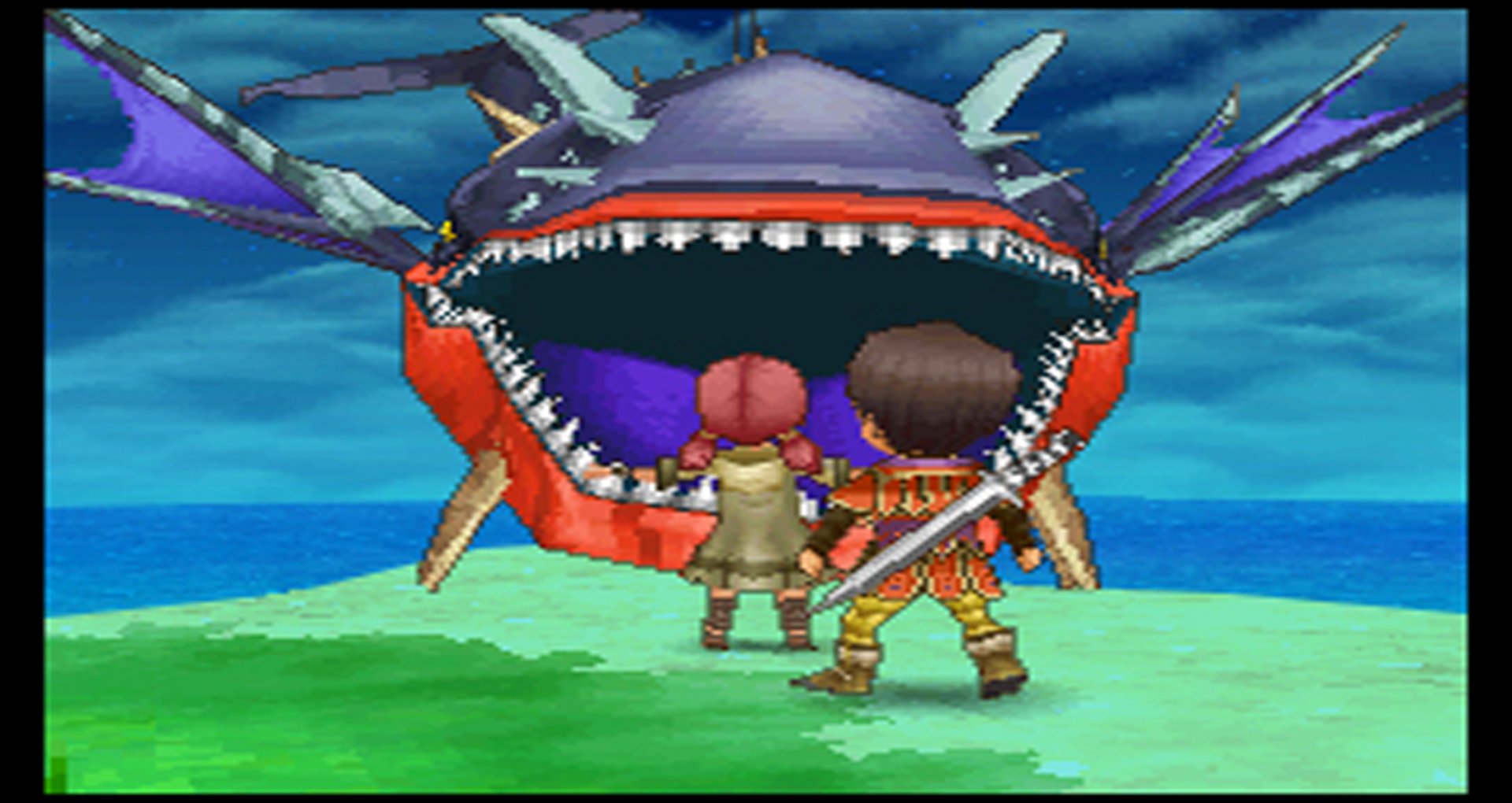
... for a Dragon Quest game
That phrase is hard to escape when talking about the “new” aspects of Dragon Quest IX. So many features are fresh… for a Dragon Quest game. Seeing enemies on the map is so advanced… for a Dragon Quest game. The character creation is really deep… for a Dragon Quest game. That doesn’t mean that they aren’t great features regardless of what series they appear in, but DQ is getting to them a bit later than everyone else. And even with all the new elements, this is still a core Dragon Quest game through and through, which is its blessing and curse.
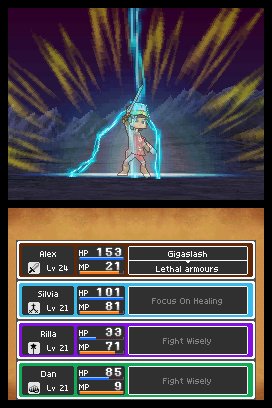
Despite originally planning the game to feature real-time battles, after public outcry from many Japanese fans, developer Square-Enix went back on that strategy and DQIX remains as committed to turn-based battles as it ever was. Aside from smaller things, like attack multipliers and earned battle skills, the combat system is nearly unchanged from when the four-person party system introduced in Dragon Quest III.
That isn’t really a knock against DQIX for one reasons. The battle formula has been so finely-tuned and perfected over the years that nobody does classic, simple-to-learn-but-surprisingly-deep turn-based battles better than this series does. These days nobody else does classic, turn-based battles period. Well that’s not completely true, but the niche titles that still hold on to what nearly all RPG giants have left behind don’t have a sliver of the budget or production values that DQIX has.
Another welcome classic returns in with the job system, called vocations this time around. Despite the name change, it’s similar to when it was introduced in DQIII, but includes some of the small but worthwhile changes that have come over time. You gain skill points almost every level, which can be applied to one of five skill types every time you level up in a certain job. It works great in specializing a character, which makes up for the fact that the characters level resets every time you switch vocations, which can be a real pain, but you get used to it, as the more advanced jobs are only available much later on.
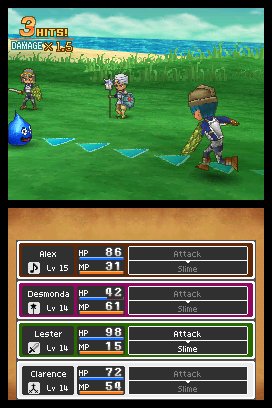
That we’re reminded often of the third Dragon Quest, a game more than 20 years old, isn’t really a bad thing either, as that was a real high point for the series and a fan favorite. However, it gives you an idea of what you’re in for gameplay-wise, which is a mildly updated take on a formula that came together before many of our readers were born.
When an angel collects fruit
While we appreciate the refined retro quality of the gameplay, that same vibe isn’t as welcome in the story. You play as a formerly invisible angel (sorry, Celestrian) who once helped the unsuspecting people of Earth, but now has taken mortal form after some shenanigans up in heaven. To right this wrong, you’re tasked with collecting the seven lost Fyggs, which are pieces of divine fruit from that blossomed from the World Tree. Once you find them all, you might just to get to the bottom of why the Almighty seems to be pissed at you and your haloed ilk.
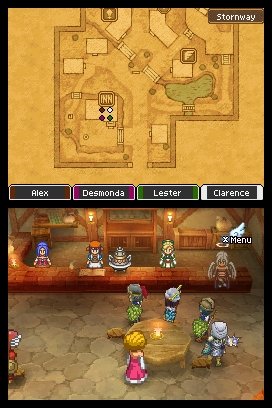
Yes, collecting seven of something by traveling the world and tracking down whatever new bad guy got their hands a mythic artifact isn’t particularly new, that’s for sure, but if it was too new then it wouldn’t be Dragon Quest, would it? And we do give props to the divine origins of the main character. Since the hero is driven to help people so he can collect their thanks as heavenly energy, at least the side quests and character motivations for constantly assisting people make more sense.
But the plot has two major enemies. Firstly, it’s that other than your hero, whose silence and overall blandness don’t make him/her all that interesting to begin with, no member of your party matters to the story. You basically purchase your other team members at an inn and have them join your team, which is exactly how it worked in DQIII. It allows for those characters to be designed by the player as much as the main character is, but that advantage is outweighed by the fact they have zero impact on the story.
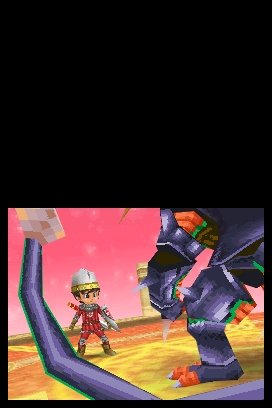
The other thing holding the story back is the localization. When Nintendo announced they were publishing Dragon Quest IX in the US and UK, many wondered if they’d also handle the translation. Sadly that isn’t the case, as Square-Enix gave DQIX the same treatment the last few games in the series got: heavy accents. All regular folks in the game talk in faux-British slang, while others get even more extreme in their accents, such as the town of Scottish fishermen. Since there’s no spoken dialogue, you just read the increasingly ridiculous looking dialogue to yourself and hear the accents in your head. It can really take you out of the story.
Join the party
We can somewhat forgive the lack of interesting team members, as the game was made with multiplayer in mind, as up to three friends can replace your party as you travel the world together. It’s a different way to enjoy the game, though we’re a bit antisocial and prefer to travel the world alone. When you take into consideration that only the multiplayer host keeps any of the story progress from the local multiplayer set-ups, it’s even less attractive. Still, it is an enjoyable diversion and gives you a chance to show off what an amazing character you’ve made, but good luck finding another player with a copy.
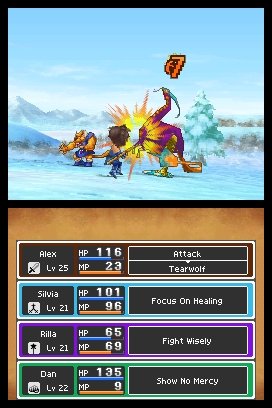
Additionally, on top of the 100-plus optional quests open in single or multiplayer, you can take the game online and download more side quests and items even after if you’ve beat the 40-hour storyline. There have been tales of many Japanese players putting over 100 hours into the game regularly, and even one famous game developer says he’s played for 400 hours. So if you only have enough cash for one game to play all summer, this could be it.
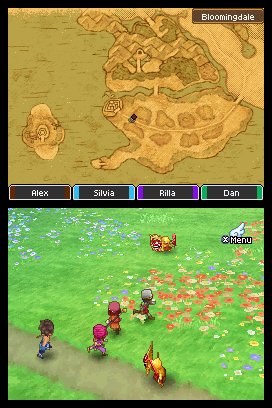
In spite of all the improvements on the classic and endlessly replayable formula, Dragon Quest IX is still too stuck in its old ways for its own good. It’s one of the most approachable in series’ history, but is too much of a traditional grindfest to be attractive to many new players. But if you’re a traditionalist just like the developers seem to be, you’ll really appreciate this fresher spin on the tried-and-true method. For better or worse, while every other game risks their popularity on western and modern styles, Dragon Quest will always give you exactly what you expect, a classic JRPG.
Jul 9, 2010
Dragon Quest V? Yes.
V has possibly the best story the series has ever seen, making character and plot the main focus, instead of class systems and grind-a-thons. Still, even with all the bells and whistles in the DS remake, it’s a SNES game at heart. For all the grief we give IX for being old-school, when you compare its innovations and looks to V, you get some idea of how far the series has come.
Final Fantasy XIII? No, but it’s close.
This is by no means a fair comparison, but these two are still the premier JRPG series, so it only seems right to compare the two most recent entries. DQIX loses in the looks department and it comes off as ancient compared to all the new ideas in FFXIII. However, if you’re part of the vocal group that thought FFXIII didn’t feel like a Final Fantasy, than the much more conventional DQIX is right up your alley.
Pokemon HeartGold/SoulSilver? Maybe.
They both play pretty similar, because once you discount the monster collecting, core Pokemon titles are old school RPGs. And both series have a history of modest additions while keeping the series very traditional. But DQIX is for a slightly more mature crowd than Pokemon’s base, so it could work as a nice bridge for exclusively Pokemon players into the grand world of JRPGs.
More info
| Genre | Role Playing |
| Description | Though certainly not a huge shift for the series, Dragon Quest IX has a near-perfect mix of classic JRPG style and grand (for the DS) visuals to make a great portable adventure. |
| Franchise name | Dragon Quest |
| UK franchise name | Dragon Quest |
| Platform | "DS" |
| US censor rating | "Everyone 10+" |
| UK censor rating | "7+" |
| Release date | 1 January 1970 (US), 1 January 1970 (UK) |
Henry Gilbert is a former GamesRadar+ Editor, having spent seven years at the site helping to navigate our readers through the PS3 and Xbox 360 generation. Henry is now following another passion of his besides video games, working as the producer and podcast cohost of the popular Talking Simpsons and What a Cartoon podcasts.
